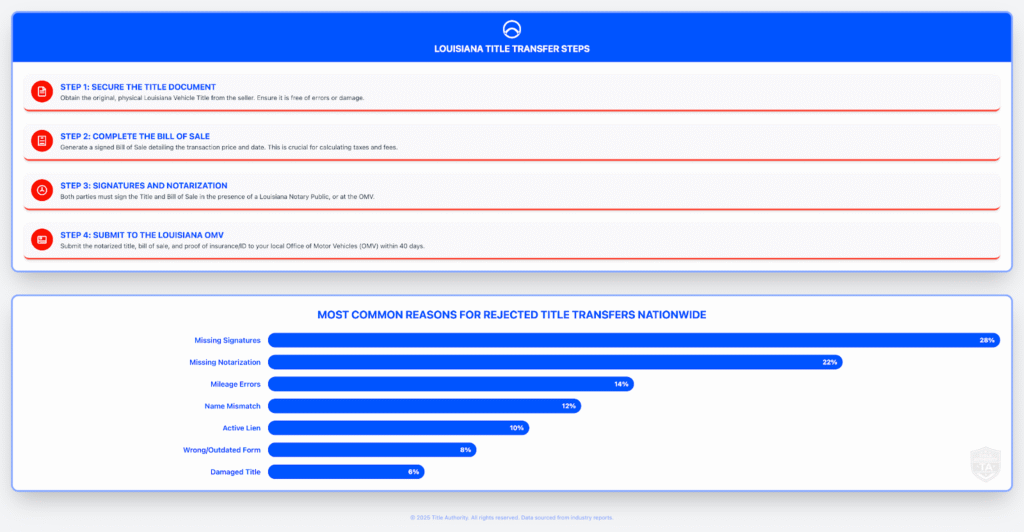Louisiana Vehicle Title Transfer Requirements Explained

Vehicle title transfers in Louisiana confuse many buyers and sellers. You deal with rules, signatures, taxes, and paperwork that must be correct the first time. This guide provides clear steps to help you avoid delays and complete your transfer without the need for repeat visits.
A Louisiana vehicle title proves ownership. Any change in ownership, whether through a sale, donation, or inheritance, requires a title transfer. The steps look simple, but each situation carries specific document requirements.
Documents for a Standard Private Sale
Start with the essentials. Bring these items to complete a private sale:
- The current Louisiana title
- A bill of sale with buyer and seller details
- Identification for both parties
- Mileage written clearly
- Notarized signatures
- Payment for taxes and state fees
If the name on the title does not match the seller in front of you, bring a power of attorney or court documents. Louisiana rejects titles with scratched-out fields or altered sections.
Document requirements can shift based on the situation, and real-life experiences in Louisiana title transfers often demonstrate how small details can alter what people need to bring. These slight variations are why many buyers review the process closely before they start.
Requirements for Dealership Sales
Dealerships process most of the title work. Buyers still need to provide identification and insurance, but the dealer files the necessary forms. Issues appear when the vehicle comes from another state or financing changes after the sale. Keep copies of everything.
Out-of-State Purchases
Out-of-state vehicle title transfers require more documentation. Bring the original title, a bill of sale, insurance, and any lien release. Louisiana may request a physical VIN inspection to verify that the number on the vehicle matches the number on the title.
Research from the Insurance Information Institute shows that more than 35 percent of used vehicles sold each year involve interstate transfers. This increases the likelihood of errors and missing information.
Inherited Vehicles
Inherited vehicles follow a separate process. Depending on the family structure, the state may require:
- A small succession affidavit
- A court document naming the authorized heir
- The prior title
- Identification for all heirs
- Signatures for each listed person
More heirs mean more signatures. Missing even one signature slows the process.
Why Louisiana Rejects Title Transfers
The Office of Motor Vehicles checks every field before accepting a transfer. The most common failure points include:
- Missing signatures
- No notarization
- Mileage errors
- Name mismatch
- Active lien with no release
- Incorrect or outdated forms
- Damaged or unreadable titles
A report from the Louisiana Legislative Fiscal Office notes that about 20 percent of rejected transactions involve incomplete or damaged documents.
Taxes and State Fees
Louisiana calculates taxes based on the sale price and the type of vehicle being sold. Bring a detailed bill of sale to confirm the value. You may also see charges for registration, plate transfers, and state filing.
How to Speed Up the Process
You speed up the title transfer when you bring …read more
Source:: Social Media Explorer








